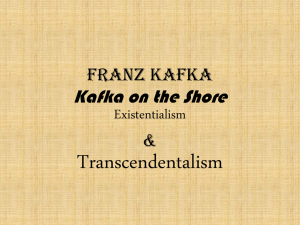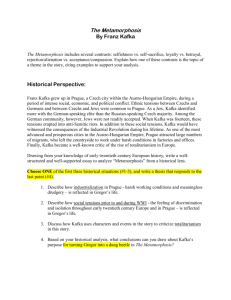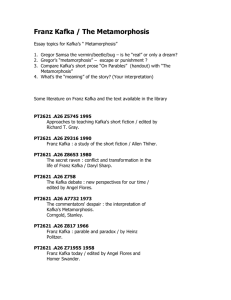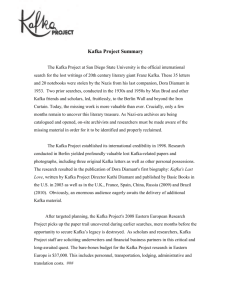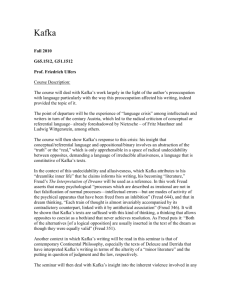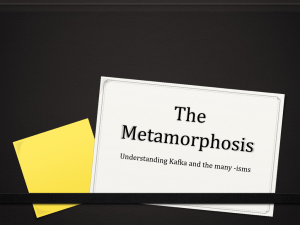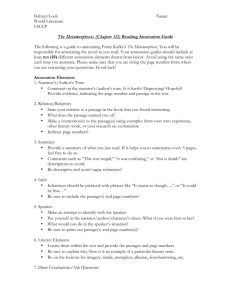KAFKA-APPEAL
advertisement
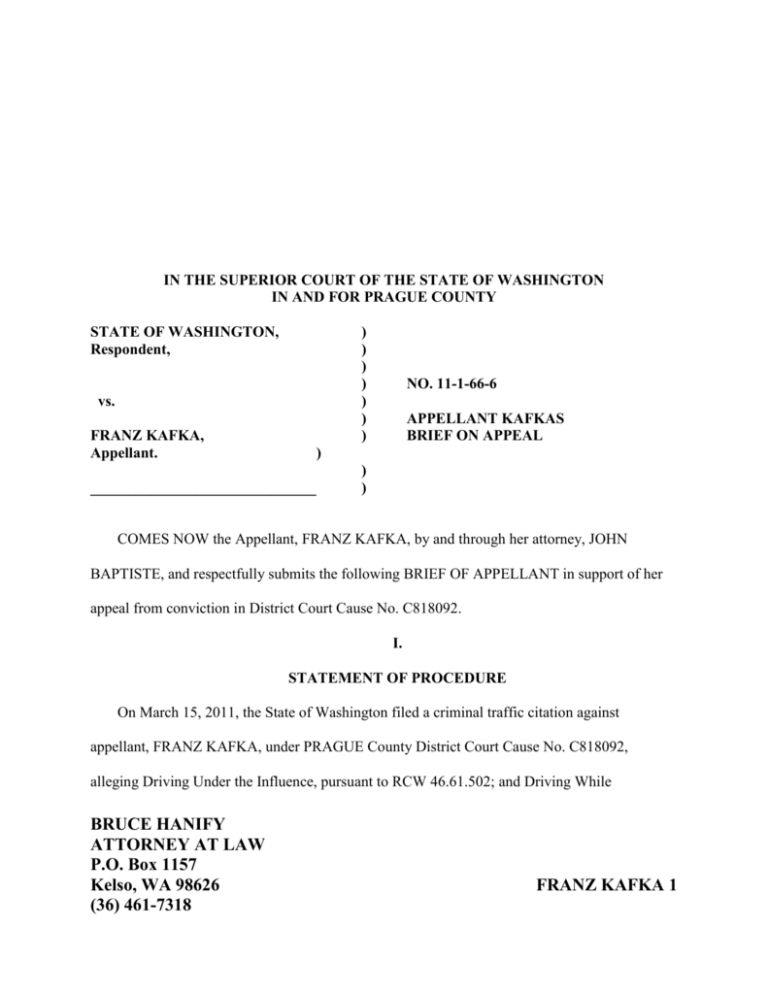
IN THE SUPERIOR COURT OF THE STATE OF WASHINGTON IN AND FOR PRAGUE COUNTY STATE OF WASHINGTON, Respondent, ) ) ) ) ) ) ) vs. FRANZ KAFKA, Appellant. NO. 11-1-66-6 APPELLANT KAFKAS BRIEF ON APPEAL ) ______________________________ ) ) COMES NOW the Appellant, FRANZ KAFKA, by and through her attorney, JOHN BAPTISTE, and respectfully submits the following BRIEF OF APPELLANT in support of her appeal from conviction in District Court Cause No. C818092. I. STATEMENT OF PROCEDURE On March 15, 2011, the State of Washington filed a criminal traffic citation against appellant, FRANZ KAFKA, under PRAGUE County District Court Cause No. C818092, alleging Driving Under the Influence, pursuant to RCW 46.61.502; and Driving While BRUCE HANIFY ATTORNEY AT LAW P.O. Box 1157 Kelso, WA 98626 (36) 461-7318 FRANZ KAFKA 1 Suspended, pursuant to RCW 46.61.342(c). This case was tried before a jury, the Honorable Judge Pro Tem GUSTAV MEYRINK presiding, on June 8, 2011. The jury found Ms. KAFKA guilty oF both counts (160). Said allegations were based upon the following facts, adduced at trial: On March 15, 2001 vehicle owner Karla Pennington (RP 22) loaned her 2001 Toyota Highlander to Dennis Grimes (father of Ms. Pennington's niece) and Kacy "Dawn" KAFKA (RP, pp. 22-25). She observed FRANZ KAFKA get into the driver's side at 3:40 p.m. (RP 26). The agreement was for KAFKA and Grimes to pick Ms. Pennington up at 5. At 5:01, Mr. Grimes called Ms. Pennington to tell her they were on their way (RP 27). A total of four phone calls were exchanged with Mr. Grimes cell phone. Always, Ms. Pennington was led to believe (presumably by Mr. Grimes) that the two were "on their way" back to Pennington's work (RP 28). Over objection, Ms. Pennington was allowed to testify that Mr. Grimes could not have driven the vehicle with the seat pushed as far forward as it appeared in Exhibit 9, a photograph obtained from an unidentified source and admitted without objection (RP 31). BRUCE HANIFY ATTORNEY AT LAW P.O. Box 1157 Kelso, WA 98626 (36) 461-7318 FRANZ KAFKA 2 On March 15, 2011, PRAGUE County Sheriff’s Deputy O'SHAUGHNESSY was dispatched to the area of North Barr Road and Highway 101 (RP 54) regarding a silver Toyota Highlander on North Barr Road in the ditch. The vehicle was unoccupied; there were no persons present at the scene (RP 55). Deputy O'SHAUGHNESSY observed a backpack on the passenger floorboard (56). As Deputy O'SHAUGHNESSY surveyed this scene, he observed Ms. KAFKA approaching his location on foot (59). At trial the following exchange took place: Q Okay, let’s stop then we can have Trooper SWISHER SWEET try. Now she indicated she had just come from where then? A The bus stop on (interrupted) MR. KRESKIN: Objection, hearsay. THE STATE: The Defendant? RP 61 Defense counsel KRESKIN demanded, and was permitted, a 3.5 hearing as to a variety of incriminating statements made by defendant the state intended to offer into evidence (RP, pp. 61-64). However, no motion was made to strike Ms. KAFKA’s answer. At the conclusion of the CrRLJ 3.5 hearing, Judge MEYRINK ruled that at the time of law enforcement’s initial BRUCE HANIFY ATTORNEY AT LAW P.O. Box 1157 Kelso, WA 98626 (36) 461-7318 FRANZ KAFKA 3 encounters with Ms. KAFKA, there was no reason to believe she was a suspect and she was not treated as a suspect, and therefore there was no reason to Mirandize her prior to her being advised of her rights in the BAC room (RP, pp. 84-85). Per Deputy O'SHAUGHNESSY, Ms. KAFKA indicated that she had just come from the nearby bus stop and wanted to retrieve her backpack from the vehicle (RP, pp 85-87). Deputy O'SHAUGHNESSY stated he could smell intoxicating beverages on her person from approximately four feet from Ms. KAFKA (RP 87). She was "slurring a lot of her words" and appeared to be intoxicated. She Deputy O'SHAUGHNESSY that she had been a passenger in the vehicle; that a male had been driving; and that she had realized she had left her backpack in the vehicle (RP 88). Deputy O'SHAUGHNESSY stated: A Um, she was difficult to understand just from mumbly and slurring and I had to ask her -- several times I had to say "can you say that again? I don't understand what you're saying." RP 89 While Deputy O'SHAUGHNESSY was trying to ascertain her name, she indicated to him that she did not wish to speak to him; that she would prefer speaking with a different officer. By BRUCE HANIFY ATTORNEY AT LAW P.O. Box 1157 Kelso, WA 98626 (36) 461-7318 FRANZ KAFKA 4 that time, Trooper SWISHER SWEET and Deputy Wagner arrived. Deputy O'SHAUGHNESSY indicated that as Ms. KAFKA did not want to speak with him, perhaps one of them could speak to her (RP, pp. 88-89) . Trooper SWISHER SWEET testified that he was dispatched to a collision on Barr Road in PRAGUE County on March 15, 2011 (RP 98). Trooper SWISHER SWEET testifed as follows: Q And what name was she going by at that time -- or what name did she give you as her name, reference name? A I believe we may have identified her as -- I don't remember, it was confusing to what her name was at that time. Um, I was confused at least. Q Okay so what other name beside Kacy and KAFKA did you hear at that time? A The name of Dawn came up and eventually it was determined that it was Kacy Dawn KAFKA. RP 102 Defense counsel did not object to this testimony. Trooper SWISHER SWEET testified that Ms. KAFKA told him the name of the driver was "Tom" (RP 103). The following testimony was offered, without objection: BRUCE HANIFY ATTORNEY AT LAW P.O. Box 1157 Kelso, WA 98626 (36) 461-7318 FRANZ KAFKA 5 Q Okay and in this particular case were you able to get a clear statement from her about what had happened? A No, it was more of an interpretation of overall statements that I gathered what she was trying to say. Q Okay and did you then ask her about how tall Tom was? A Yes. Q And what if anything did she tell you about that? A She said Tom was about my height. Q And you are? A I'm 5 foot 10 inches. Q Alright and did you do any observation of the vehicle of the seat position of the driver's seat based on that? A Yes, sir, that's part of our training. Yes, I noticed the seat was fairly close to the steering wheel. Q And what seat are you talking about? A The driver's seat. BRUCE HANIFY ATTORNEY AT LAW P.O. Box 1157 Kelso, WA 98626 (36) 461-7318 FRANZ KAFKA 6 Q And so because you are about the same height as Tom, what if anything did you do next? A I sat in the driver's seat and had one of the deputies take a picture of me. RP, pp. 104-105. It was obvious from the photographs that a man Trooper SWISHER SWEET's height could not have fit into the cab, as then configured (RP 106). The photographs were admitted without objection from defense counsel and published to the jury, with a demonstration by Trooper SWISHER SWEET which purported to show the distance from the back seat to the front seat of the vehicle (RP, 105-108). This was not objected to, though the testimony was clearly inadmissible under ER 701, which provides: If the witness is not testifying as an expert, the witness' testimony in the form of opinions or inferences is limited to those opinions or inferences which are (a) rationally based on the perception of the witness, (b) helpful to a clear understanding of the witness' testimony or the determination of a fact in issue, and (c) not based on scientific, technical, or other specialized knowledge within the scope of rule 702. BRUCE HANIFY ATTORNEY AT LAW P.O. Box 1157 Kelso, WA 98626 (36) 461-7318 FRANZ KAFKA 7 In this case there were no vitals or photographs about the alleged driver; the state's witnesses were not qualified as experts; and the proffered evidence was so patently specious that it should have been excluded as irrelevant and unduly prejudicial. The prosecutor's line of questioning proceeded as follows: Q Okay, I apologize. So at that point what, if anything, did you think about what may have happened? A The person named Tom who was my height probably was not driving the vehicle. MR. KRESKIN: Objection, opinion. THE COURT: Sir? MR. KRESKIN: Opinion. THE COURT: Overruled. Go ahead. . . . . . A At that point the driver's seat with it being in the forward position, me sitting in it, me observing it, it did not appear someone of my height would have been able to sit or would have been driving the vehicle with it that far forward as BRUCE HANIFY ATTORNEY AT LAW P.O. Box 1157 Kelso, WA 98626 (36) 461-7318 FRANZ KAFKA 8 well as we noted the backpack had been on the floorboards, the story of her forgetting the backpack didn't seem -- didn't add up because how could you forget a large backpack in between your legs (interrupted) MR. KRESKIN: Objection, narrative. THE COURT: Sustained. RP, pp. 109-110. Trooper Ellofsen described his arrest of Ms. KAFKA as follows: Q Alright so what happened then? Once you read her her rights, what did you do? A She didn't give me an answer that was satisfactory in her understanding her rights and willing to talk to me. She was not cooperating at that time. At that time she was placed under arrest for DUI. RP 113 This testimony was not objected to; nor was the relevance of the manner of her arrest objected to at RP 114. BRUCE HANIFY ATTORNEY AT LAW P.O. Box 1157 Kelso, WA 98626 (36) 461-7318 FRANZ KAFKA 9 Trooper SWISHER SWEET was allowed to testify at length -- without objection -- as to Ms. KAFKA's apparent inability to comprehend her rights. And then, at RP 117, the following was testified to: A I asked "how can I help" and she said "get someone here that understands me." Q Okay and during that period of time, did you offer any legal assistance to her? A At least two times I asked her if she wanted to talk to an attorney. Q And what was her response? A She did not, she said no. RP 116 At RP 119, the BAC Datamaster printout was admitted without objection. No testimony other than that of Trooper SWISHER SWEET was utilized to lay the foundation for admission of the printout. At RP, pp. 133, et seq., Deputy Oien was permitted to testify about observations he made about Ms. KAFKA's handcuffs, and her desire to have them loosened, or removed. BRUCE HANIFY ATTORNEY AT LAW P.O. Box 1157 Kelso, WA 98626 (36) 461-7318 FRANZ KAFKA 10 Defense counsel did not object to the following leading questions: Regarding the number of training hours Deputy O'SHAUGHNESSY had: Q That's pretty close to a thousand I would submit. A I would think so, yes. RP 53 Q Okay, at some point did you obtain other information that made her a suspect? A Yes, sir. RP 75 The following was objectionable hearsay: Q Okay, and what information did you obtain? A Deputy O'SHAUGHNESSY advised me who the registered owner was and who the registered owner said she had loaned the vehicle to and that was Dawn KAFKA, excuse me, Dawn. RP 76 BRUCE HANIFY ATTORNEY AT LAW P.O. Box 1157 Kelso, WA 98626 (36) 461-7318 FRANZ KAFKA 11 The following evidence was not objected to, and was clearly irrelevant and overly prejudicial: Q What if anything did Trooper SWISHER SWEET do about her handcuffs? A Trooper SWISHER SWEET removed her handcuffs because her hands were handcuffed behind her back and then re-handcuffed her so her hands were up front and readjusted them so they were somewhat looser. RP, pp. 134-161 At RP 136, the following took place: Q Did Trooper SWISHER SWEET ever offer her an attorney? A Multiple times she was offered a public defender by Trooper SWISHER SWEET and myself. Q Okay, and what was her response? A She decline a public defender. She stated she had a family attorney and that if we could not contact the attorney for her that we would have to wait until the morning when she could obtain legal counsel before any tests were done. Q Is it possible to delay a test like that until morning? BRUCE HANIFY ATTORNEY AT LAW P.O. Box 1157 Kelso, WA 98626 (36) 461-7318 FRANZ KAFKA 12 A That's a negative. RP, 136-137 None of this testimony was objected to. Deputy Oien was then allowed to testify how the ambient alcohol in the BAC room interfered with the operation of the Datamaster (RP, pp. 137138). As DPA Schrawyer conceded in his rebuttal (RP 158), no effort was made to locate Mr. Dennis Grimes, the other person to whom the vehicle owner loaned the vehicle to (RP, pp. 2430). II. ISSUES PRESENTED A. WAS MS. KAFKA DENIED DUE PROCESS OF LAW BY THE ADMISSION OF OBJECTIONABLE EVIDENCE AT TRIAL? B. WAS MS. KAFKA DENIED HER FEDERAL AND STATE CONSTITUTIONAL RIGHTS BY THE JURY HEARING EVIDENCE THAT SHE ASKED FOR LEGAL COUNSEL OR OTHERWISE ATTEMPTED TO INVOKE HER RIGHT TO REMAIN SILENT? BRUCE HANIFY ATTORNEY AT LAW P.O. Box 1157 Kelso, WA 98626 (36) 461-7318 FRANZ KAFKA 13 C. WHETHER THERE WAS SUFFICIENT EVIDENCE TO CONVICT MS. KAFKA D. WAS DEFENSE COUNSEL'S PERFORMANCE INEFFECTIVE? III. ARGUMENT A. MS. KAFKA WAS DENIED A FAIR TRIAL The cumulative effect of defense counsel's failure to object to leading questions and speculative questions, and the admission of exhibits without objection, and of "demonstrations" that had no actual foundation in fact, denied Ms. KAFKA a fair trial. The due process clauses of both the state and federal constitutions declare that no person shall be deprived of life, liberty, or property without due process of law. Due process includes the guarantee of a fair trial, including conviction on nothing less than proof beyond a reasonable doubt in a criminal case. The United States Supreme Court has held that the test for whether an evidentiary rule violates due process is if " the introduction of this type of evidence is so extremely unfair that its admission violates ‘fundamental conceptions of justice.’" State v. Scherner, 225 P.3d 248, 153 Wn.App. 621, 651 (2009). The irrelevant, extended discussion of the handcuffs on Ms. KAFKA during the BAC portion of her arrest; the admission without objection of a Datamaster printout with no BRUCE HANIFY ATTORNEY AT LAW P.O. Box 1157 Kelso, WA 98626 (36) 461-7318 FRANZ KAFKA 14 foundation other than the testimony of the trooper; leading questions from the prosecution to establish the number of training hours a law enforcement officer had, or allowing one officer to testify about another officer's intentions, and the arrestee's state of mind; the admission of hearsay testimony in response to leading questions; the admission of opinions as to the ultimate fact of whether Ms. KAFKA was driving at the time of the accident based upon a non-existent person who's height and general size were said to be similar to the arresting trooper, all point to what has to be likened to a Soviet "show trial." The moment anyone other than Ms. Pennington was allowed to testify as to the size and shape of an individual they didn't know and hadn't seen was unduly prejudicial under ER 403 and should have been objected to immediately, and denied admission. Trial counsel repeatedly failed to lodge ER 401 and ER 403 objections, which resulted in a denial of Ms. KAFKA's due process rights. ER 403 provides: Although relevant, evidence may be excluded if its probative value is substantially outweighed by the danger of unfair prejudice, confusion of the issues, or misleading the jury, or by considerations of undue delay, waste of time, or needless presentation of cumulative evidence. BRUCE HANIFY ATTORNEY AT LAW P.O. Box 1157 Kelso, WA 98626 (36) 461-7318 FRANZ KAFKA 15 Deputy Oien's testimony about the handcuffs on Ms. KAFKA, in addition to the admission of a BAC printout without foundation, and opinions as to ultimate fact based upon facts not in evidence, all combined in such a way as to deny Ms. KAFKA a fair trial. For these reasons alone, Ms. KAFKA's conviction should be reversed. The matter should be remanded for new trial or dismissal. B. MS. KAFKA'S RIGHT TO REMAIN SILENT/RIGHT TO COUNSEL WERE PREJUDICED BY THE STATE'S EVIDENCE For some inexplicable reason, the prosecution found it necessary to offer evidence that Ms. KAFKA wanted to speak with a family member, and also asked for a lawyer. This inflammatory, unduly prejudicial evidence was not objected to and is, on its face, flagrantly unconstitutional. In State v. Burke, 163 Wn.2d 204, 181 P.3d 1 (2008) our state supreme court reversed a felony conviction for reasons quite similar to those presented here: In summary, often distinguished as prearrest silence and post arrest silence, the Supreme Court has established two basic rules: one based upon the Fifth Amendment right to remain silent Before Miranda warnings are given and one based upon due process under the Fourteenth Amendment when the State issues Miranda warnings promising defendants that their silence will not be used against them. The Fifth Amendment prohibits impeachment based upon the exercise of silence where the accused does not waive the right and does not testify at trial. BRUCE HANIFY ATTORNEY AT LAW P.O. Box 1157 Kelso, WA 98626 (36) 461-7318 FRANZ KAFKA 16 Griffin, 380 U.S. at 615, 85 S.Ct. 1229. Due process under the Fourteenth Amendment also prohibits impeachment based on silence after Miranda warnings are given, even if the accused testifies at trial. Doyle, 426 U.S. at 619, 96 S.Ct. 2240. However, no constitutional protection is violated if a defendant testifies at trial and is impeached for remaining silent Before arrest and Before the State's issuance of Miranda warnings. Jenkins, 447 U.S. at 240, 100 S.Ct. 2124. Finally, states are permitted to formulate their own evidentiary rules, so long as they do not fall below minimum constitutional standards. Id. We have concluded that even when the defendant testifies at trial, use of prearrest silence is limited to impeachment and may not be used as substantive evidence of guilt. Lewis, 130 Wn.2d at 705-06, 927 P.2d 235 (citing Easter, 103 Wn.2d 228, 922 P.2d 1285). In circumstances where silence is protected, a mere reference to the defendant's silence by the government is not necessarily a violation of this principle; however, when the State invites the jury to infer guilt from the invocation of the right of silence, the Fifth Amendment and article I, section 9 of the Washington Constitution are violated. Id. at 706-07, 927 P.2d 235; see also Crane, 116 Wn.2d at 331, 804 P.2d 10. With these principles in mind, we turn to the arguments of the parties. State v. Burke, 163 Wn.2d 204, 217, 181 P.3d 1 (2008) The court found that this was no harmless error, i.e., that the evidence of Burke's guilt was so overwhelming the jury would have found him guilty regardless. The fact that a person's constitutional rights can be disregarded in so blatant a manner on its face prevents a person from receiving a fair trial. For this reason alone, Ms. KAFKA's conviction should be vacated, with prejudice. BRUCE HANIFY ATTORNEY AT LAW P.O. Box 1157 Kelso, WA 98626 (36) 461-7318 FRANZ KAFKA 17 C. THERE WAS INSUFFICIENT EVIDENCE TO CONVICT MS. KAFKA OF DRIVING THE SUSPECT VEHICLE The numerous errors that occurred in this case obscure the most important fact of all: no one saw Ms. KAFKA driving the vehicle while impaired, or when it wrecked; the owner of the vehicle did not testify as to any impairment; none of the police officers breathed a word about where the car keys were, or whether Ms. KAFKA had keys on her person. Finally, there was ample evidence that another person had actually been driving the vehicle. Rather than investigate that possibility, the jury was allowed to speculate on the height and breadth of a nonexistent driver. This evidence severely prejudiced Ms. KAFKA's ability to present a defense, as noted above, and did nothing to actually support the state's specious case. A claim of insufficiency admits the truth of the State's evidence and requires that all reasonable inferences be drawn in favor of the State and interpreted most strongly against the defendant. State v. Salinas, 119 Wash.2d 192, 201, 829 P.2d 1068 (1992). Circumstantial evidence is accorded equal weight with direct evidence. State v. Delmarter, 94 Wash.2d 634, 638, 618 P.2d 99 (1980). In reviewing the evidence, we give deference to the trier of fact, who resolves conflicting testimony, evaluates the credibility of witnesses, and generally weighs the persuasiveness of the evidence. State v. Walton, 64 Wash.App. 410, 415-16, 824 P.2d 533 (1992), review denied, 119 Wash.2d 1011, 833 P.2d 386 (1992). State v. Holt, 119 Wn.App. 712, 720, 82 P.3d 688 (2004). BRUCE HANIFY ATTORNEY AT LAW P.O. Box 1157 Kelso, WA 98626 (36) 461-7318 FRANZ KAFKA 18 D. MS. KAFKA WAS DENIED EFFECTIVE ASSISTANCE OF COUNSEL The errors in this record are practically too numerous to list. For one thing, the BAC printout was admitted without proper foundation; the jury was allowed to speculate on the likelihood that a phantom driver could not have driven the vehicle at the time of the wreck, when there was insufficient evidence as to the time and circumstances of the wreck; the jury was allowed to hear evidence of Ms. KAFKA requesting a lawyer; perhaps a dozen objectionable questions from the prosecution were allowed in, unchallenged. This trial was, literally, a mess. The Sixth Amendment to the United States Constitution and article I, section 22 of the Washington Constitution guarantee the right to effective assistance of counsel. Strickland, 466 U.S. at 685-86, 104 S.Ct. 2052; State v. Thomas, 109 Wash.2d 222, 229, 743 P.2d 816 (1987). In Strickland, the United States Supreme Court set forth the prevailing standard under the Sixth Amendment for reversal of criminal convictions based on ineffective assistance of counsel. 466 U.S. 668, 104 S.Ct. 2052, 80 L.Ed.2d 674. Under Strickland, ineffective assistance is a twopronged inquiry: "First, the defendant must show that counsel's performance was deficient. This requires showing that counsel made errors so serious that counsel was not functioning as the ‘ counsel’ guaranteed the defendant by the Sixth Amendment. Second, the defendant must show that the deficient performance prejudiced the defense. This requires showing that counsel's errors were so serious as to deprive the defendant of a fair trial, a trial whose result is reliable. Unless a defendant makes both showings, it cannot be said that the conviction ... resulted from a breakdown in the adversary process that renders the result unreliable." BRUCE HANIFY ATTORNEY AT LAW P.O. Box 1157 Kelso, WA 98626 (36) 461-7318 FRANZ KAFKA 19 Thomas, 109 Wash.2d at 225-26, 743 P.2d 816 (quoting Strickland, 466 U.S. at 687, 104 S.Ct. 2052); see also State v. Cienfuegos, 144 Wash.2d 222, 226, 25 P.3d 1011 (2001) (" Washington has adopted the Strickland test to determine whether a defendant had constitutionally sufficient representation." ). Under this standard, performance is deficient if it falls " below an objective standard of reasonableness." Strickland, 466 U.S. at 688, 104 S.Ct. 2052. The threshold for the deficient performance prong is high, given the deference afforded to decisions of defense counsel in the course of representation. To prevail on an ineffective assistance claim, a defendant alleging ineffective assistance must overcome " a strong presumption that counsel's performance was reasonable." State v. Kyllo, 166 Wash.2d 856, 862, 215 P.3d 177 (2009). Accordingly, the defendant bears the burden of establishing deficient performance. McFarland, 127 Wash.2d at 335, 899 P.2d 1251. State v. Grier, 246 P.3d 1260, 1262 (2011) IV. CONCLUSION The number of errors in this case, when combined with a violation of Ms. KAFKA's constitutional rights to seek counsel and to remain silent, require that this conviction be reversed and vacated. BRUCE HANIFY ATTORNEY AT LAW P.O. Box 1157 Kelso, WA 98626 (36) 461-7318 FRANZ KAFKA 20
